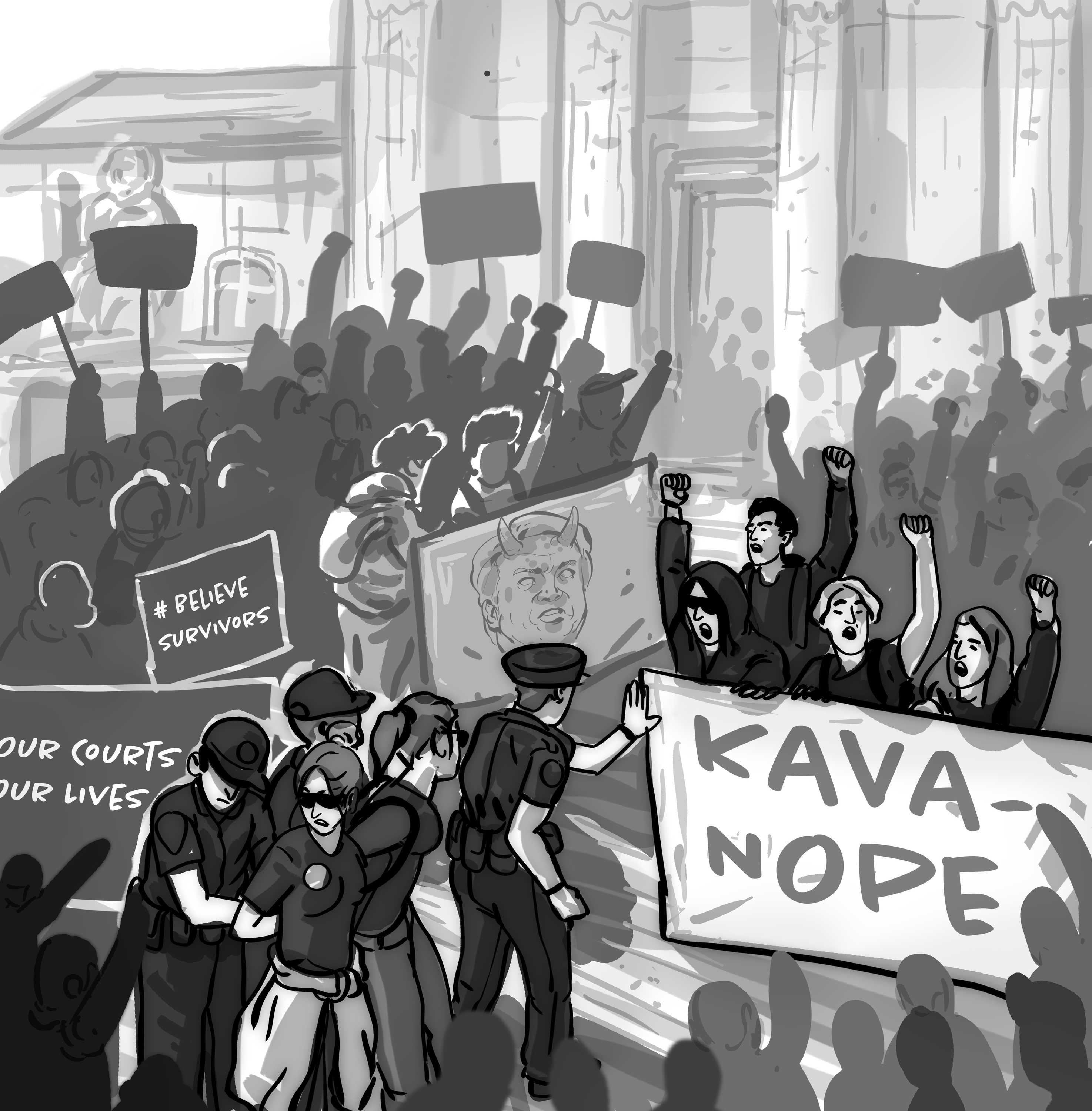This essay was published in a two-part series of opinions writers reflecting on their experience being arrested while protesting. Read the second account here.
I was arrested and detained – along with 164 others – while protesting the confirmation of Supreme Court Justice Brett Kavanaugh at the U.S. Capitol Building earlier this month. More than 100 people were arrested for staging a sit-in on the steps, while the rest of the 164, including me, were arrested in the U.S. Senate Gallery for disrupting the final roll call vote. One-by-one, as senators cast their “yeas” and “nays,” protesters all around the Senate Gallery stood up and shouted things like “I do not consent” and “believe survivors.”
After my arrest, I was held for six hours at a processing facility before being released with a fine and a court date. While spending six hours in jail was certainly not how many college students would choose to spend fall break, I left feeling empowered and more energized as a citizen than ever before.

Cartoon by Jekko Syquia
People knock civil disobedience as needlessly divisive, disruptive and even counter-productive. But civil disobedience is both empowering and effective – and it is patriotic. It is a means to surround yourself with people who are as passionate about an issue as you are. At times when it feels like your lone voice is inadequate, civil disobedience can echo and strengthen your voice to epic proportions.
Participating in the protests not only made me feel more powerful – it actually made me more powerful. Civil disobedience amplifies your voice and the dramatics of group action draw more attention, thus spreading your message further. By the time I was released, videos of the Senate Gallery disruption were already garnering thousands of views on Facebook and YouTube.
On GW’s campus, more students should explore and participate in direct action, especially during these politically divisive times. On a campus as politically active as GW’s, there is a paradox. While it seems like there is always an injustice to speak up about, students settling with feeling helpless and overwhelmed instead of channeling that energy into action.
Civil disobedience remains unpopular across America with many believing that it is immoral and unjustified. President Donald Trump conveyed such a belief in a series of tweets calling protesters “extreme” and “dangerous.” Many argue that civil disobedience incites violence, is ineffective, creates chaos and is illegal, but these descriptions paint an incomplete picture. In fact, analysis of every protest in 2017 showed that fewer than 300 people were injured out of the millions who protested in 2017.
Others support their claim that it is negative because it is illegal, but conflating legality with morality is dangerous. Legal things are not necessarily just, and visa versa. It was illegal for Rosa Parks to sit in the front of the bus and it was illegal for queer people to riot at Stonewall. Yet today, we view these two actions as justified and brave. Similarly, it was illegal to disrupt Congress, but I felt it was justified to oppose the confirmation of an accused sexual predator without extensive investigation into the claims against him.
The GW community should embrace civil disobedience. In fact, many students have an obligation to participate in civil disobedience. One of the driving reasons I chose to be arrested was because I knew I could manage the burdens of such an arrest. I am physically able, I have money to pay for fines and because I am white, I have easy interactions with police. Those with similar assets to me – including a fellow opinions writer who further highlighted the importance of recognizing privilege in protest – have a responsibility to stand for those who cannot stand for themselves.
Students at GW, while politically engaged, hold a sense of entitlement when it comes to political outcomes because so many students come from positions of privilege and are often not accustomed to the notion that governmental institutions may not work for them or accomplish their goals.
In a time when norms and institutions are routinely violated and degraded, students must learn how to advocate for themselves and voice their concerns even beyond the voting booth. If institutions do not represent students, then students must learn to represent themselves.
As a queer person and a victim of sexual violence, I was not going to sit idly by while a mold of my abusers was elevated to the highest court in the land – one with the power to strip away many of my rights. I didn’t participate in civil disobedience because I seek to promulgate violence or chaos or illegality, but because – like one of my fellow protesters bravely shouted, “I am a patriot.” I love my country and I will do everything in my power to amend and address the issues presently facing it – but I am only one voice against Congress.
Students of all political persuasions to join me in civil disobedience and lobby our government directly to spark true change. One voice can be drowned out, but a mass group cannot be silenced. Our community and our country will be better for it.
Jack Murphy, a freshman majoring in political science, is a Hatchet opinions writer.

